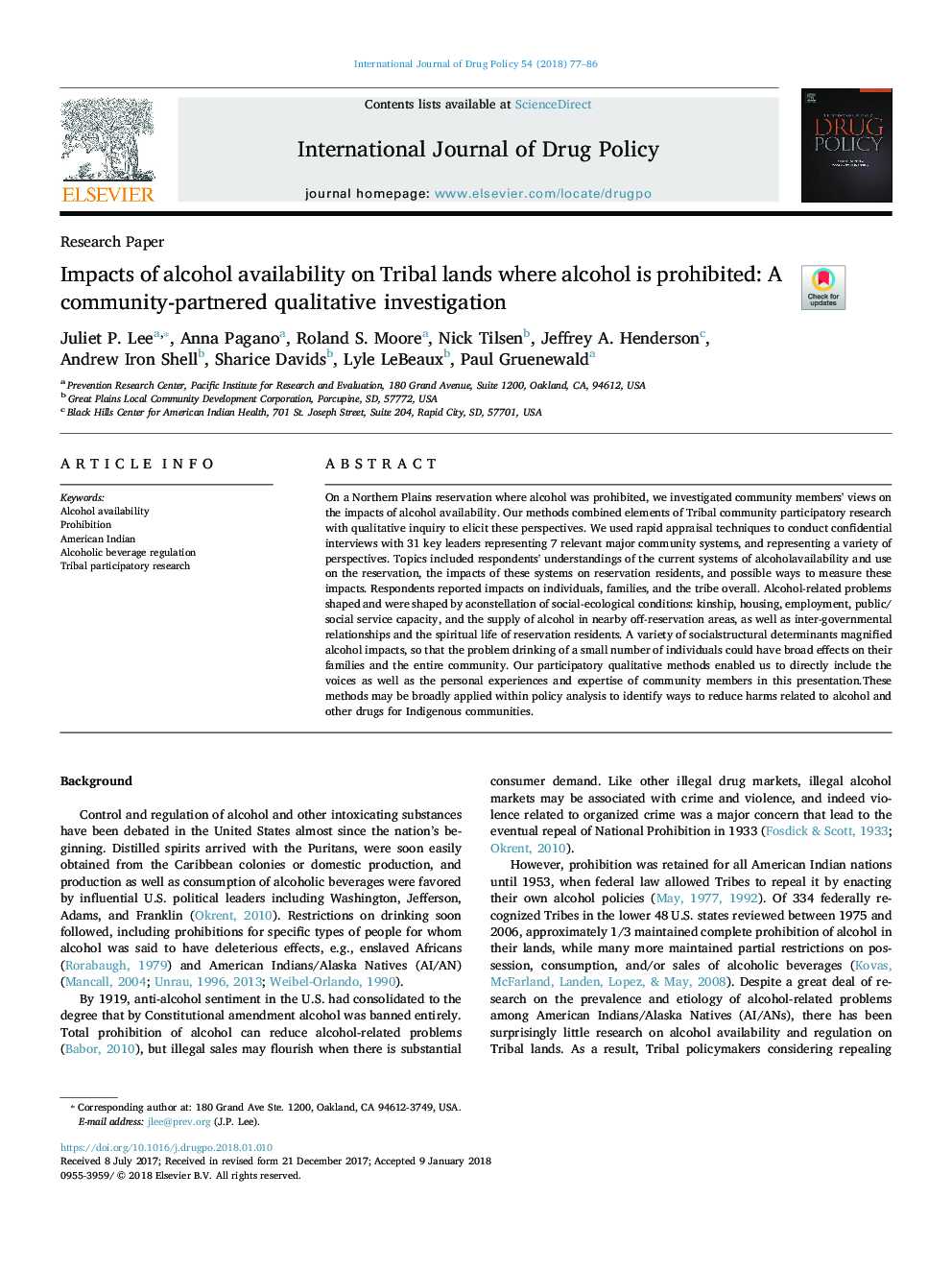| کد مقاله | کد نشریه | سال انتشار | مقاله انگلیسی | نسخه تمام متن |
|---|---|---|---|---|
| 7512071 | 1486251 | 2018 | 10 صفحه PDF | دانلود رایگان |
عنوان انگلیسی مقاله ISI
Impacts of alcohol availability on Tribal lands where alcohol is prohibited: A community-partnered qualitative investigation
ترجمه فارسی عنوان
تاثیرات در دسترس بودن الکل در سرزمین های قبیله ای که الکل ممنوع است: تحقیقات کیفی مشارکت اجتماعی
دانلود مقاله + سفارش ترجمه
دانلود مقاله ISI انگلیسی
رایگان برای ایرانیان
کلمات کلیدی
در دسترس بودن الکل ممنوعیت آمریکایی هندی، مقررات نوشیدنی الکلی، تحقیق مشارکتی قبیله ای،
ترجمه چکیده
در رزرو دشتهای شمالی که الکل ممنوع بود، دیدگاه اعضای جامعه را درمورد تاثیرات موجود بودن الکل بررسی کردیم. روش های ما ترکیبی از عناصر تحقیق مشارکتی قبیله ای جامعه با تحقیق کیفی برای تشخیص این دیدگاه ها است. ما با استفاده از تکنیک های ارزیابی سریع برای مصاحبه های محرمانه با 31 رهبر کلیدی که 7 سیستم اصلی مربوط به جامعه را تشکیل می دهند استفاده کردیم و از منظر گوناگون به نمایش گذاشتیم. مباحث شامل درک پاسخ دهندگان سیستم های موجود در دسترس بودن الکل و استفاده از رزرو، تاثیر این سیستم ها بر ساکنان رزرو و روش های ممکن برای اندازه گیری این تاثیرات است. پاسخ دهندگان به افراد، خانواده ها و قبیله به طور کلی تحت تاثیر قرار گرفتند. مشکلات مربوط به الکل شکل گرفته و با شکل گیری شرایط اجتماعی-محیطی شکل گرفتند: خویشاوندی، مسکن، اشتغال، ظرفیت خدمات عمومی / اجتماعی و عرضه الکل در مناطق غیرمجاز نزدیک، و نیز روابط بین دولتی و زندگی معنوی ساکنان رزرو. بسیاری از عوامل تعیین کننده اجتماعی-ساختاری تاثیرات الکل را افزایش داده اند، به طوری که مشکلی که نوشیدن یک تعداد کمی از افراد می تواند اثرات گسترده ای بر خانواده ها و کل جامعه داشته باشد. روش های کیفی مشارکتی ما به ما این امکان را داد که به طور مستقیم شامل صداها و تجارب شخصی و تخصص اعضای جامعه در این ارائه شود. این روش ها می توانند در تجزیه و تحلیل سیاست ها به طور گسترده ای مورد استفاده قرار گیرند تا راه های کاهش آسیب های مربوط به الکل و داروهای دیگر برای جوامع بومی را شناسایی کنند.
موضوعات مرتبط
علوم پزشکی و سلامت
پزشکی و دندانپزشکی
روانپزشکی و بهداشت روانی
چکیده انگلیسی
On a Northern Plains reservation where alcohol was prohibited, we investigated community members' views on the impacts of alcohol availability. Our methods combined elements of Tribal community participatory research with qualitative inquiry to elicit these perspectives. We used rapid appraisal techniques to conduct confidential interviews with 31 key leaders representing 7 relevant major community systems, and representing a variety of perspectives. Topics included respondents' understandings of the current systems of alcohol availability and use on the reservation, the impacts of these systems on reservation residents, and possible ways to measure these impacts. Respondents reported impacts on individuals, families, and the tribe overall. Alcohol-related problems shaped and were shaped by a constellation of social-ecological conditions: kinship, housing, employment, public/social service capacity, and the supply of alcohol in nearby off-reservation areas, as well as inter-governmental relationships and the spiritual life of reservation residents. A variety of social-structural determinants magnified alcohol impacts, so that the problem drinking of a small number of individuals could have broad effects on their families and the entire community. Our participatory qualitative methods enabled us to directly include the voices as well as the personal experiences and expertise of community members in this presentation. These methods may be broadly applied within policy analysis to identify ways to reduce harms related to alcohol and other drugs for Indigenous communities.
ناشر
Database: Elsevier - ScienceDirect (ساینس دایرکت)
Journal: International Journal of Drug Policy - Volume 54, April 2018, Pages 77-86
Journal: International Journal of Drug Policy - Volume 54, April 2018, Pages 77-86
نویسندگان
Juliet P. Lee, Anna Pagano, Roland S. Moore, Nick Tilsen, Jeffrey A. Henderson, Andrew Iron Shell, Sharice Davids, Lyle LeBeaux, Paul Gruenewald,
